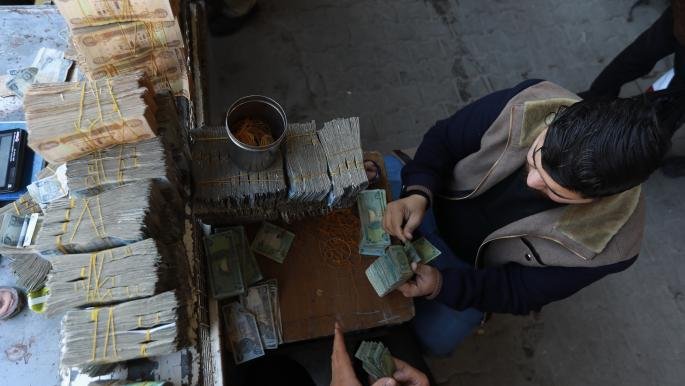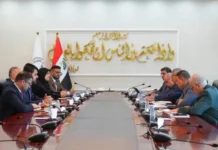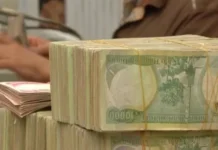The recent sanctions imposed by the US Treasury Department on 14 Iraqi banks have caused quite a stir in the country. Some months ago, the department had imposed similar sanctions on four major banks due to their involvement in money laundering operations and financial dealings with Iran. As a result, the value of the dinar against the dollar has decreased and many depositors are rushing to the sanctioned banks to withdraw their deposited dollars.
I noticed that there was a significant drop in the Iraqi dinar against the dollar on the Baghdad and Erbil stock exchanges. It went down by 1520 dinars per dollar from its previous range of 1450 to 1460 dinars on Wednesday. According to the Wall Street Journal, US officials have prohibited 14 Iraqi banks from carrying out transactions in dollars.
According to the newspaper report, the Treasury Department and the Federal Reserve Bank have imposed a ban as part of their comprehensive campaign against the transfer of US currency to Iran.
As per an official source from the Central Bank of Iraq who spoke to Al-Araby Al-Jadeed, several banks operating in the region have received US sanctions. The list of banks includes Islamic Advisor Bank for Investment and Finance, Al-Qartas Islamic Bank for Investment and Finance, Taif Iraq Company, Elaf Bank, Erbil Bank for Investment and Finance, International Islamic Bank, Trans-Iraq Bank, Mosul Bank for Development and Investment, Al-Rajih Bank, Sumer Commercial Bank, Trust International Islamic Bank, Ur Islamic Bank, Islamic World Bank for Investment and Finance, and Zain Iraq Islamic Bank for Investment and Finance. The bank’s management has been notified of these sanctions through an official communication.
Local penalties
According to the source, the central bank administration took action to prohibit all dollar transactions with certain banks and also prevented them from participating in the currency auction on Thursday.
According to an anonymous source, the sanctions imposed on 14 Iraqi banks only apply to their dealings in dollars and will not affect their other banking operations, which include maintaining accounts worth billions of dinars for citizens and processing salaries for a large number of employees. However, the sanctions are expected to have a significant impact on the Iraqi economy and could lead to a scarcity of US dollars, which may result in an increase in the exchange rate of the dollar in the local market. This could prompt individuals to buy more dollars and take them out of the market, which would further raise its value.
Gradual rise of the dollar
According to Mustafa Al-Karawi, a member of the Finance Committee in the Iraqi parliament, the United States’ imposition of sanctions on several banks will lead to significant economic consequences in the Iraqi financial market. He mentioned that the exchange rate of the dollar has already increased rapidly in just a few hours after the sanctions were imposed.
Al-Karawi has issued a warning that the dollar’s exchange rate will continue to increase gradually every day. This situation calls for the government to take concrete steps to address it, as it could lead to a cash crisis akin to the one experienced in recent months at the start of the new government’s formation. Iraqi diplomacy should also be employed to engage with the US Treasury and the US Federal Reserve in order to tackle this matter.
Market
The Iraqi dinar has experienced a significant drop following the US sanctions placed on 14 banks. The Finance Committee of the Iraqi parliament will be inviting the relevant authorities from the Central Bank to discuss the effects of these sanctions on private Iraqi banks. They will also be inquiring about the bank’s course of action to tackle the significant rise in the local market’s exchange rate.
I read that according to financial and economic expert Mustafa Akram Hantoush, the recent US sanctions will have negative effects on the Iraqi banking sector and cause a significant increase in the value of the dollar in the local market. Hantoush believes that these sanctions show that these banks have violated international laws.
According to Hantoush, there is a lack of control by the Central Bank of Iraq over the banking sector’s operations, as evidenced by the US sanctions on certain banks. He also noted that the US exercises control over the banks, making it difficult to transfer any dollars from Iraq to countries under US sanctions, particularly Iran.
Not the last
Hanoush pointed out that the US has previously imposed sanctions on Iraqi banks and it’s possible that more could be imposed in the future. To prevent further sanctions on local banks, the Iraqi government needs to take a stand and closely monitor bank activities to ensure that they do not engage in transactions with countries such as Iran, Syria, Lebanon, and Russia involving dollars.
According to an official from Elaf Bank, they have received a notice prohibiting their transactions in dollars due to their inclusion in the US sanctions list. The official emphasized that they will continue to operate using the local currency. However, they declined to comment on the US decision regarding the involvement of punished banks in “suspicious” financial transactions.
According to Iraqi financial expert Ahmed Al-Janabi, private banks have not followed instructions from the Central Bank and are now harming the Iraqi economy. Al-Janabi cites multiple reasons for the banks’ failure, including their focus on short-term profits in currency auctions at the expense of financial stability, their inability to attract and grow deposits, and their failure to invest effectively due to a lack of real capital and economic opportunities.
Although the Iraqi government has implemented a set of financial measures, including fixing the Iraqi dinar’s exchange rate at 1,320 dinars per one dollar, several months have passed, and there is still a significant gap between the official exchange rate approved by the Central Bank of Iraq and the parallel market.




